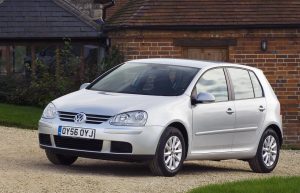Recalls: Volkswagen Mk.5 Golf
Overview
Manufacturers, or importers, issue recalls for defects or faults which have the potential to cause injury. Generally, manufacturers will inform the original buyers if their vehicle is subject to a recall and of the steps required to remedy the defect or fault. Please note that the recalls below (if any) are for Australian-delivered vehicles only. Furthermore, the number of recalls should not be taken as an indication of a model’s reliability or its safety more generally.
Recalls: Volkswagen Mk.5 Golf
Volkswagen Golf 1.9 TDI: fuel pump could break
In March 2005, a recall was issued for Volkswagen Mk.5 Golf vehicles with 1.9-litre turbo-diesel engines. In these vehicles, the fuel pump could break due to a production fault – as a result, the pump housing was not adequately tightened and a diesel fuel leak may occur (PRA 2005/7612).
2009-10 Volkswagen Golf 2.0 TDI: potential diesel fuel leak
In February 2012, a recall was issued for Volkswagen Mk.5 Golf models fitted with 2.0-litre turbo-diesel engines and manufactured between 2009 and 2010. In these vehicles, the engine’s fuel injection pulses could coincide with the natural frequency of the injector line, producing a resonance that creates additional stress in the fuel line. As a result, the injector line for the number two cylinder could develop small cracks and cause fuel to leak. In the presence of an ignition source, a fire could therefore result. To fix, Volkswagen installed an improved fuel injector line for the number two cylinder and vibration dampers on all of the injector lines (PRA 2012/13017).
Volkswagen Golf with DQ250 DSG: loss of drive/power
In June 2013, a recall was issued for Volkswagen Mk.5 Golf vehicles that had six-speed DQ250 Direct Shift Gearboxes (DSGs); AustralianCar.Reviews understands that the recalled vehicles were manufactured from 1 September 2008 to 31 August 2009. In these vehicles, the wiring harness of a temperature sensor within the transmission may have insufficiently crimped connector wires. This could cause the temperature sensor to incorrectly detect high gearbox oil temperatures and activate the clutch protection function – this would illuminate a flashing gear warning light and cause 1) juddering of the vehicle, 2) a reduction in engine torque, and 3) opening of the clutch (as if the gearbox were in ‘neutral’). As such, loss of power to the wheels could pose a hazard to occupants of the vehicle and other road users. For the recalled vehicles, Volkswagen provided a software update for the gearbox control unit (PRA 2013/13625).
2009 and 2010 model year Volkswagen Golf: ABS and ESC may not operate
In March 2017, a recall was issued for 2009 and 2010 model year Volkswagen Golf vehicles. In these vehicles, thermal overload within the ABS/ESC control unit could interrupt the current flow and this could prevent the ABS and ESC systems from functioning as intended; a warning light would also illuminate on the dashboard. In critical driving situations, the absence of ABS and ESC could increase the risk of a collision and injury to vehicle occupants. As part of the recall, the software for the ABS/ESC control unit would be updated to regularly check the operation of the unit (PRA 2017/15956).
Problems and faults: Volkswagen Mk.5 Golf
Overview
This section identifies potential problems, causes and fixes based on the experiences of owners and repairers, online sources and technical service bulletins. This information is provided solely for reference purposes and AustralianCar.Reviews recommends that only properly qualified persons carry out repairs or modifications. Furthermore, the number of items below should not be taken as an indicator of a model’s reliability or the frequency with which they may occur.
To report a problem or fault to the AustralianCar.Reviews team, please use the Contact Us form. Note that AustralianCar.Reviews does not offer advice on automotive problems or disputes; such enquiries will not receive a reply. For vehicles purchased from dealers after 1 January 2011, please see our Australian Consumer Law fact sheet.
1.4 Twincharger (TSI) engine: stretched timing chain
In an autobild.de article published in April 2012, a Volkswagen employee admitted that its 1.4 ‘Twincharger’ TSI engine was susceptible to stretched timing chains. According to Volkswagen, worn stamping tools caused:
- The holes in the chain links to miss the targeted manufacturing tolerances; and,
- Small burrs on the chain links that would cause abrasive wear to the timing chain.
If the timing chain stretched, the change in the engine’s camshaft timing could cause the valves and pistons to collide such that the engine would have to be re-built or replaced. A common symptom of a stretched timing chain is a rattling noise from the engine bay (see video below).
It is understood that the manufacturing defect was rectified for post-2012 1.4 TSI ‘Twincharger’ engines, though Volkswagen has not identified the production dates or engine codes of affected engines. As such, the 125 kW 1.4 TSI BLG engine in the Volkswagen Mk.5 Golf GT and GT Sport may be susceptible to this problem. According to Volkswagen, the number of poorly manufactured chains was in the ‘low hundreds’.
Carbon deposits (build-up) on intake valves
Volkswagen’s naturally aspirated, direct injected petrol engines (such as the Golf’s 2.0 FSI) are considered susceptible to accumulating carbon deposits (or build up) on the intake valves. In these direct injection petrol engines, carbon deposits may accumulate on the stem and throat of the intake valve due to:
- the vaporisation of oil which is not trapped by the oil separator; or
- unburned fuel and exhaust gases that escape past the piston rings and enter the crankcase (‘blow-by’).
Since direct injection engines do not spray fuel on the backside of the intake valves, the detergent properties of the fuel cannot remove the carbon build up (as occurs in port injected engines). Symptoms of carbon deposits on the intake valve include difficulty starting the vehicle (hard starting), misfiring and misfire engine codes and reduced engine performance. Potentially, these deposits can result in damage to the catalytic converter and, for turbocharged engines, the turbocharger itself if bits of the deposit break off and enter the exhaust. To remove the carbon deposits, the intake must be removed and the valves cleaned manually. To reduce the incidence of carbon deposits, a common aftermarket measure is the fitment of an oil vapor catch can. The catch can receives dirty air from the crankcase via the Positive Crankcase Ventilation (PCV) valve, filters it and returns it to the intake manifold via the PCV port.
Volkswagen USA: DQ250 DSG fault and extended warranty
In December 2009, Volkswagen USA initiated a ‘Customer Satisfaction Campaign‘ for 2007-09 ‘model year’ Volkswagen vehicles that had six-speed DSG transmissions.
Faulty component and jerky gearshifts
According to Volkswagen, the six-speed DQ250 DSG transmissions of a limited number of 2007-09 ‘model year’ Volkswagen vehicles had a faulty component inside the transmission’s Mechatronic unit. Specifically, the bushings of two solenoid valves inside the mechatronic unit could wear prematurely, causing the clutches inside the transmission to ‘operate less smoothly than before’ and provide jerky gearshifts. According to Volkswagen, the vehicle remained safe to drive since it did not affect forward or rearward motion of the vehicle. As part of the ‘Customer Satisfaction Campaign’, Volkswagen would replace mechatronic units that were identified as faulty by Volkswagen’s diagnostic tool.
Extended DSG warranty
As part of the Customer Satisfaction Campaign, Volkswagen extended the warranty on the DQ250 DSG transmission to ten years or 100,000 miles (160,900 kilometres) – whichever occurred first – from the vehicle’s original ‘in-service’ date. The ‘in-service’ date was defined as the date that the vehicle was delivered to the original purchaser/lessee or, if the vehicle was a demonstrator, the date that the vehicle commenced service.
Under the extended warranty, the Volkswagen dealer was responsible for diagnosing and repairing the DSG transmission at no cost to the owner provided that the vehicle was maintained in accordance with the requirements in the owner’s manual.
Problems and faults: Volkswagen Mk.5 Golf
- The air conditioning may become gradually warmer due to a faulty temperature sensor causing the evaporator to freeze up.
- The airbag warning light may illuminate due to high resistance in a connector under the driver and/or passenger seat; if so, the connector must be replaced.
- Where fitted, the satellite navigation system may develop several faults (i.e. no map, inaudible audio, et cetera) and require the software to be upgraded.
- Where fitted, the premium Panasonic audio system may provide poor radio sound quality; if so, the radio module needs to be reflashed.
- Noises from the rear springs may be fixed by replacing the galvanized spring plate with a rubber-coated plate.
- The windows may separate from their regulators, requiring the glass to be glued in place.
- A software fault may cause the power windows to retract. Inserting the key into the driver’s door lock, turning the key to the unlock position and holding it there may reset the on-board computer and cause the windows to wind back.
- For models with the 1.4-litre super- and turbo-charged engine, a shudder when accelerating may be due to a faulty supercharger clutch – this may be accompanied by the ‘check engine’ light illuminating.




